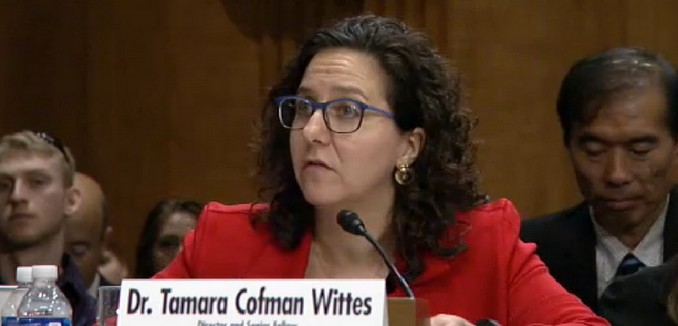Iran is propping up the regime of Syrian dictator Bashar al-Assad in order to ensure that Hezbollah, which both countries support, has the continued capability to wage war against Israel, expert witnesses told the Senate Foreign Relations Committee at a hearing Tuesday.
“The gains made by the Assad regime (with Russian and Iranian help) over the past eight months enhance the disturbing prospect of a Syrian government remaining in power in Damascus that is dependent on Iranian funding, Iranian military support, and the importation of Iranian-backed militias,” Tamara Cofman Wittes, the director of the Brookings Institution’s Center for Middle East Policy, wrote in her prepared testimony (.pdf). “Iran is deeply committed to the survival of its Alawi client and the maintenance of Syria as a channel for Iranian support to Hizballah,” she added.
Any conclusion to the Syrian civil war that institutionalizes Iranian dominance in the region, Wittes continued, would strengthen Hezbollah and “likely spell an escalation in Iranian weapons transfers…[that] could increase Hizballah’s capacity to wage asymmetric war against Israel, at great cost to Israel’s civilian population.”
Former U.S. Ambassador to Syria Robert S. Ford, now a senior fellow at the Middle East Institute, told the committee that he was “a little puzzled that there seem to be efforts by the administration to promote business with Iran in Europe when Iran is causing us problems in regions such as Syria.”
“We need to be clear about what Iran’s interested in in Syria…and that is they want a government in Damascus that has good relations with Hezbollah and will give Hezbollah sustained strategic depth in its confrontation against Israel. That is the Iranian goal, and that goal is at great odds with American policy,” he said.
The toll of any future war precipitated by an Iranian-backed Hezbollah against Israel is likely to be high. IDF deputy chief of staff Maj. Gen. Yair Golan told reporters last month that the next war between Israel and Hezbollah would be “devastating” due to Hezbollah’s widely-reported tactic of hiding military assets in civilian areas. An Israeli defense official told The New York Times last year that the buildup of Hezbollah’s terror infrastructure in southern Lebanese villages meant that “civilians are living in a military compound” and that their lives were at risk. A few days later, a newspaper linked to Hezbollah confirmed the Israeli assessment. Reports emerged two years ago that Hezbollah was offering reduced-price housing to Shiite families who allowed the terrorist group to hide rocket launchers in their homes.
[Photo: Senate Foreign Relations Committee]




